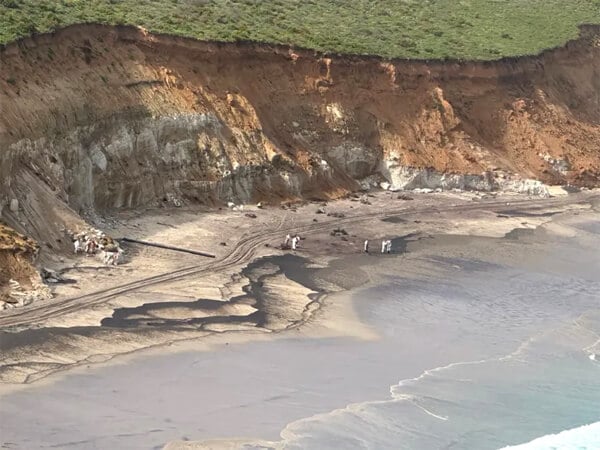
The cleanup operation to remove oil and debris from the grounded bulker Ultra Galaxy is winding down while a tender was issued for the removal of the remains of the vessel. The South African Maritime Safety Authority reported at the end of last week that they would continue to monitor the beaches for additional oil washing up, but that they believe most of the fuel has been retrieved or lost in the ocean along with the fertilizer cargo.
“The P&I Club issued an invitation to tender to the industry in the last week, with interest from both local and international companies,” reports SAMSA to remove the wreck off South Africa’s west coast beach, as soon as possible. A survey of the area showed that salvage efforts of the wrecked Panama-flagged general cargo vessel, the Ultra Galaxy, was no longer feasible.
SAMSA believes that all the oil aboard the vessel has been released and due to the breaking apart of the vessel in the unrelenting winter storms, there are no longer any intact fuel tanks aboard. Over 500 tons of oil and fuel, as well the fertilizer cargo was lost at sea due to stormy weather. At the time of the grounding, SAMSA reports in addition to low amounts of hydraulic and related oils, the Ultra Galaxy had 332 tons of VLSFO (very low sulfur fuel oil) and 180 tons of MGO (marine gas oil) in her tanks as bunker fuel. Before she started breaking, up salvors were able to remove eight tonnes of bunkering marine gas oil from the wreck.
“Inspections conducted by foot, drone, and helicopter on Wednesday, August 21, indicate that the oil on the mining beaches has been cleaned and that there is no visible oil slick or contamination along the beaches, extending as far down as the Olifants River mouth and five km north of the wreck,” said SAMSA. “With all the fuel presumed to have been released and collected on the nearby mining beach, the focus of the operation has now shifted to a monitoring and caretaking phase.”

Cleanup operations are winding down but SAMSA reports beach monitoring will continue (SAMSA)
SAMSA reports it has reduced the crews on the beaches but will continue to monitor for fuel coming ashore in case there are pockets of fuel still trapped in the wreck. The cleanup teams will remain on-site for at least the next two storm cycles as a precautionary measure.
The fertilizer cargo was released when the vessel’s hatch covers were dislodged due to the angle the wreck came to rest on the beach and the pounding surf. SAMSA believes the cargo dissolved in the ocean and has been conducting sample testing. To date, SAMSA says zero reports of a negative impact on the environment have been received.
The Ultra Galaxy (13,800 dwt) had been sailing from Spain bound for Tanzania when on July 9 it was caught in the strong winter storms north of Cape Town on South Africa’s Atlantic coast. The presumption is that the cargo sifted in the storm causing the vessel to take on a severe list. The 18 Filipino crewmembers abandoned ship and were rescued by a fishing boat. The Ultra Galaxy washed ashore on a remote section of the west coast coming to rest on its starboard side.
The plan had been to pump the fuel from the vessel’s tanks but a series of subsequent storms flipped the vessel from side to side. The deck house was ripped off and the hull broke in two. Additional storms continued to move the hulk further breaking it apart.
.



